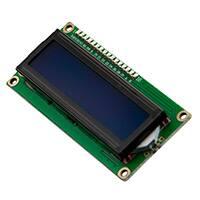I2C TWI LCD1602 Module Gadgeteer Compatible SKU
DFR0063
(https://www.dfrobot.com/product-135.html)
I2C 16x2 Arduino LCD Display Module
Introduction
This is another great I2C 16x2 LCD display (https://www.dfrobot.com/product-135.html) compatible with Gadgeteer modules from DFRobot.
With limited pin resources, your project will quicly run out of resources using normal LCDs. With this I2C interface LCD module, you only need 2
lines (I2C)to display the information.If you already have I2C devices in your project, this LCD module (https://www.dfrobot.com/category130.html) actually cost no more resources at all. The adress can be set from 0x20-0x27. Fantastic for Arduino
(https://www.dfrobot.com/category-35.html) or gadgeteer based projects.
Specification
I2C Address:0x20-0x27(0x20 default)
Back lit (Blue with white char color)
Supply voltage: 5V
Interface:I2C/TWI x1,Gadgeteer interface x2
Adjustable contrast
Size:82x35x18 mm
�Contrast Adjust
The contrast can be adjusted by the potential-meter displayed in the following picture.
Address Setting
A2
A1
A0
IIC Address
0
0
0
0x20
0
0
1
0x21
0
1
0
0x22
0
1
1
0x23
1
0
0
0x24
1
0
1
0x25
1
1
0
0x26
1
1
1
0x27
0: The Jumper Cap is connected
1: The Jumper Cap is disconnected
NOTE: The default address is 0x20. All the jumper caps will be connected from the factory.
Connection
�Connection
NOTE: V1.2 has a different power pinout from V1.1, please check the history version for the old connection diagram.
Arduino UNO (https://www.dfrobot.com/product-610.html): connect SDA to pin A4 and SCL to pin A5 on your Arduino. Arduino Leonardo
(https://www.dfrobot.com/product-698.html): connect SDA to digital pin 2 and SCL to digital pin 3 on your Arduino.
Library Support Functions
LiquidCrystal_I2C() //set the LCD address for a 16 chars and 2 line display
init() //Initialization for the LCD
clear() //clear display, set cursor position to zero
home() //set cursor position to zero
createChar() //Fill the first 8 CGRAM locations with custom characters
setCursor() //set the position of the cursor
cursor() //Turns the underline cursor on
noCursor() //Turns the underline cursor off
blink() //Turn on the blinking cursor
noBlink() //Turn off the blinking cursor
display() //Turn the display on(quickly)
noDisplay() //Turn the display 0ff(quickly)
backlight() //Turn the backlight on
noBacklight() //Turn the backlight off
scrollDisplayLeft() //Make the display scroll left without changing the RAM
�scrollDisplayRight() //Make the display scroll right without changing the RAM
autoscroll() //This will 'right justify' text from the cursor
noAutoscroll() //This will 'left justify' text from the cursor
leftToRight() //This is for text that flows Left to Right
rightToLeft() //This is for text that flows Right to Left
Sample Code
Download Sample code and library (https://raw.githubusercontent.com/DFRobot/WikiResource/master/DFR0063/LiquidCrystal_I2C.zip)
//DFRobot.com
//Compatible with the Arduino IDE 1.0
//Library version:1.1
#include
#include
LiquidCrystal_I2C lcd(0x20,16,2);
// set the LCD address to 0x20 for a 16 chars and 2 line display
void setup()
{
lcd.init();
// initialize the lcd
// Print a message to the LCD.
lcd.backlight();
lcd.print("Hello, world!");
}
void loop()
{
}
Sample sketch: Control the back light of the I2C LCD1602 Module
�Sample sketch: Control the back light of the I2C LCD1602 Module
#include
#include
#if defined(ARDUINO) && ARDUINO >= 100
#define printByte(args) write(args);
#else
#define printByte(args) print(args,BYTE);
#endif
LiquidCrystal_I2C lcd(0x20,16,2);
// set the LCD address to 0x20 for a 16 chars and 2 line display
void setup(){
lcd.init();
lcd.backlight();
// initialize the lcd
lcd.home();
lcd.print("Hello world...");
lcd.setCursor(0, 1);
lcd.print("dfrobot.com");
}
int backlightState = LOW;
long previousMillis = 0;
long interval = 1000;
void loop(){
unsigned long currentMillis
millis();
�unsigned long currentMillis = millis();
if(currentMillis - previousMillis > interval) {
previousMillis = currentMillis;
if (backlightState == LOW)
backlightState = HIGH;
else
backlightState = LOW;
if(backlightState == HIGH)
else lcd.noBacklight();
lcd.backlight();
}
}
If you want to use the library's own sample code, pay attention to modify the initialization statement, need to change:
LiquidCrystal_I2C lcd(0x27,16,2); // set the LCD address to 0x27 for a 16 chars and 2 line display
to:
LiquidCrystal_I2C lcd(0x20,16,2); // set the LCD address to 0x20 for a 16 chars and 2 line display(All jumpers should be connected\!)
Because the default initialization statement is for LCD1602!
Old version wiki
I2C/TWI LCD1602 Module (https://www.dfrobot.com/wiki/index.php/I2C/TWI_LCD1602_Module__SKU:_DFR0063_)
Projects
�ojects
DYP-ME007 Ultrasound range finder - display distance on a I2C 2x16 LCD (http://arduino.cc/forum/index.php/topic,63302.0.html)
DFshopping_car1.png Get I2C/TWI LCD1602 Module (https://www.dfrobot.com/product-135.html) from DFRobot Store or DFRobot
Distributor. (https://www.dfrobot.com/index.php?route=information/distributorslogo)
Turn to the Top
�
很抱歉,暂时无法提供与“DFR0063”相匹配的价格&库存,您可以联系我们找货
免费人工找货- 国内价格 香港价格
- 1+128.077301+15.87650
- 3+112.398093+13.93290
- 国内价格
- 1+128.82974
- 2+113.45849
- 3+113.11879
- 4+107.25904
- 国内价格 香港价格
- 1+107.928211+13.37882
